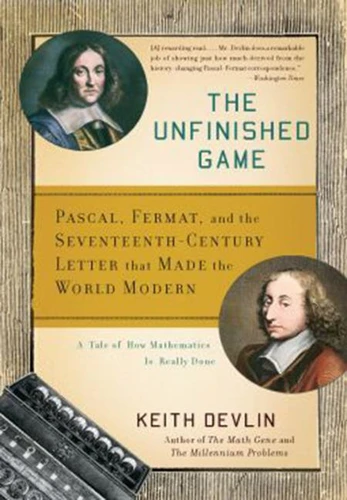The Unfinished Game. Pascal, Fermat, and the Seventeenth - Century Letter that Made the World Modern
Par :Formats :
Disponible dans votre compte client Decitre ou Furet du Nord dès validation de votre commande. Le format ePub protégé est :
- Compatible avec une lecture sur My Vivlio (smartphone, tablette, ordinateur)
- Compatible avec une lecture sur liseuses Vivlio
- Pour les liseuses autres que Vivlio, vous devez utiliser le logiciel Adobe Digital Edition. Non compatible avec la lecture sur les liseuses Kindle, Remarkable et Sony
- Non compatible avec un achat hors France métropolitaine
 , qui est-ce ?
, qui est-ce ?Notre partenaire de plateforme de lecture numérique où vous retrouverez l'ensemble de vos ebooks gratuitement
Pour en savoir plus sur nos ebooks, consultez notre aide en ligne ici
- Nombre de pages304
- FormatePub
- ISBN978-0-7867-2632-5
- EAN9780786726325
- Date de parution19/10/2008
- Protection num.Adobe DRM
- Infos supplémentairesepub
- ÉditeurBasic Books
Résumé
In the early seventeenth century, the outcome of something as simple as a dice roll was consigned to the realm of unknowable chance. Mathematicians largely agreed that it was impossible to predict the probability of an occurrence. Then, in 1654, Blaise Pascal wrote to Pierre de Fermat explaining that he had discovered how to calculate risk. The two collaborated to develop what is now known as probability theory -- a concept that allows us to think rationally about decisions and events.
In The Unfinished Game, Keith Devlin masterfully chronicles Pascal and Fermat's mathematical breakthrough, connecting a centuries-old discovery with its remarkable impact on the modern world.
In The Unfinished Game, Keith Devlin masterfully chronicles Pascal and Fermat's mathematical breakthrough, connecting a centuries-old discovery with its remarkable impact on the modern world.
In the early seventeenth century, the outcome of something as simple as a dice roll was consigned to the realm of unknowable chance. Mathematicians largely agreed that it was impossible to predict the probability of an occurrence. Then, in 1654, Blaise Pascal wrote to Pierre de Fermat explaining that he had discovered how to calculate risk. The two collaborated to develop what is now known as probability theory -- a concept that allows us to think rationally about decisions and events.
In The Unfinished Game, Keith Devlin masterfully chronicles Pascal and Fermat's mathematical breakthrough, connecting a centuries-old discovery with its remarkable impact on the modern world.
In The Unfinished Game, Keith Devlin masterfully chronicles Pascal and Fermat's mathematical breakthrough, connecting a centuries-old discovery with its remarkable impact on the modern world.






